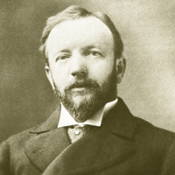
Public Domain
Henry Arthur Jones
Playwright
Biography
Henry Arthur Jones
Henry Arthur Jones was an English playwright and essayist, writing over 40 plays between 1878 and 1913.
Born in Granborough, Buckinghamshire, Jones became one of the most eminent playwrights of the late nineteenth century, ranking alongside Oscar Wilde, George Bernard Shaw, and Arthur Pinero. However, unlike his contemporaries, his work is rarely produced today. He started out writing melodramas, achieving his first popular success with The Silver King in 1882. The play told the story of a man falsely accused of murder and earned a reputation for being one of the best Victorian melodramas ever written. By the 1890s, Jones became interested in morality dramas and the question of the ‘New Woman’. The heroine of The Case of Rebellious Susan (1894) is advised to renounce her new lover and return to her faithless husband, while The Liars (1897) is a comedy of manners which also considers the question of marriage and the role of women in society. One of Jones’ final plays, Mrs. Dane’s Defence (1900), tackled the issue of female infidelity, rumor, and scandal.
Jones’ plays follow an unwavering acceptance of the rigid Victorian moral code, although his characters often sympathize with those who have fallen. This heightened morality made his plays commercially successful, but garnered criticism from his more liberal contemporaries. Oscar Wilde reportedly once said, "There are three rules for writing plays. The first rule is not to write like Henry Arthur Jones; the second and third rules are the same.” Later in life, Jones wrote a series of essays arguing against the communist political leanings of writers such as H.G. Wells and George Bernard Shaw.
Jones married in 1875 and had six children, one of whom became an actress and appeared in his plays. He died in 1929.
Shows
Shows associated with Henry Arthur Jones
Monologues
Monologues from shows associated with Henry Arthur Jones
Scenes
Scenes from shows associated with Henry Arthur Jones
Quizzes
Quizzes associated with Henry Arthur Jones
Learning Modules
Learning modules associated with Henry Arthur Jones
Additional Information
N/A